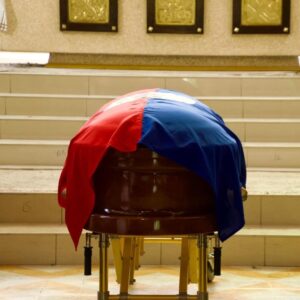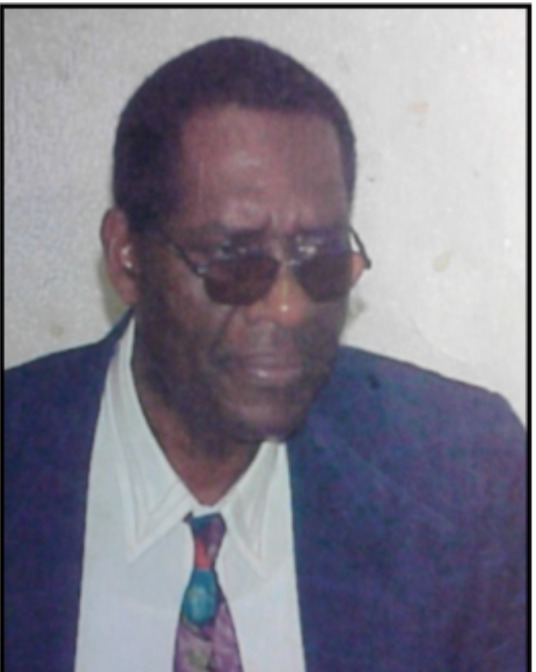Chapter IX
Patriotism
“…and the blood keeps flowing…
Where does all this spilled blood go?
the blood of murders… the blood of wars…
the blood of misery…”
(Jacques Prevert)
Already, less than a kilometer from the bridge that connected the town of Dolan to that of Passe-Reine, Céradieu could hear the rustling of the undulating water of the Mapou Chevalier River, which sent a poetic sound over the landscape smothered by its fruit trees. On the bridge deck, he passed some peasant women who were probably returning from the fields and who were going to the market in Poteau, in order to sell some agricultural produce. Céradieu watched them with a smile and, like a good and authentic peasant, made the customary greetings.
– Hello ladies, and your health?
“Hello, friend, things are not going too badly, by the grace of God,” they replied, in the manner of the bigoted faithful who were part of the choir of an abbey church.
Céradieu Mérinord headed towards a steep path cut through the middle of a small plantation of pearl millet and corn. On the other side of the ledge, he noticed Marvius, the gardener with whom he had an appointment, sitting at the foot of a calabash tree, waiting for him, and next to him, a small bag stuffed with feed. The two men shook hands, exchanged a few words, and immediately parted ways. In the distance came the singing voices of a few sharecroppers who had probably joined forces to grant a day of coumbite to one of their comrades.
Céradieu, his bag loaded on his shoulder, took the journey back in the opposite direction. He was eager to return to his lodgings to have a bite to eat. His comrade Marvius helped him from time to time, because his impecuniosity shored him up with the rafters of poverty. Jobs were becoming scarce. Céradieu lengthened his steps on the bitumen-covered macadam, cracked like mortises in a piece of wood. In this country, – which gave birth to Alexandre Dumas, the legendary author of Three Musketeers, Queen Margot, The Count of Monte Cristo, The Iron Mask etc. – it was the surges of solidarity between the country people and the ghettoized that still kept the candles of existence lit.
Blaise Pascal reminded us in Thoughts and Opuscules :
“Man is only a reed, the weakest in nature; but he is a thinking reed. The whole universe must not arm itself to crush him: a vapor, a drop of water is enough to kill him. But even if the universe were to crush him, man would be even more noble than that which kills him, because he knows that he dies, and the advantage that the universe has over him, the universe knows nothing of it.”
In truth, Normilus had already prepared for a long time to welcome the “Great Reaper” in his home located in the “Claquerdents” district, in Carénage, where he had come to settle after the tragedy. His increasingly cyclothymic state externalized his propensity for suicide. Céradieu Mérinord had noticed this. He had decided to visit him more often. And that is what he did. Normilus was absolutely not a hypochondriac. Despite the conditions of his precarious existence, his soul did not know the pangs of illness or death. None of this had managed to overshadow the greatness of his heroic courage inspired by the deep values of patriotism. Nevertheless, the idea that Mors had cruelly taken from him Amélia, Normil and Josiane, the only creatures who mattered to him in the world, had weakened him. Suffering had reduced all his reserve of energy to shreds, ground his strength in the same way that Roland’s mill crushed the grains of corn. Normilus remained shut up in the shell of his solitude. These two lines from the poet Alphonse de Lamartine summed up his sad resentments well:
“Here below, pain follows pain;
Day follows day, and sorrow follows sorrow.
Poor Amélia, believing that her companion was being executed by the Yankees, poisoned her two children, then threw herself into the raging waters of the Quinte River. The children were wearing green clothes and were lying on their backs when the justice of the peace, Aurélien Raymond, arrived at the scene of the disaster. Amélia’s body was never found. It was understood that it had remained stuck somewhere in the sewers that crossed the center of the city and channeled the waste water towards the mouths.
However, that night, Normilus and his cousin Andréus had managed to elude the vigilance of their guards. They were both running out of breath to reach the dense bushes, behind which was hidden a part of the Artibonite River. They wanted to swim across it to reach the forest that stretched for several kilometers, which would have allowed them to get away from the scene of their torture and, above all, to lose their tracks. Suddenly, one of the sentries had spotted two shadows moving away in zigzags. He fired a burst of machine gun fire without hesitation. His three colleagues imitated him. Using their Winchester rifles, they unleashed heavy fire in the direction of the two fugitives. Andréus cried out in pain and his body rolled down the steep cliff. Wounded in one leg, Normilus managed to crawl on the ground, like a ” madeleine snake “, for a good distance, before finally losing consciousness. He had regained his senses two days later in an old cottage, like a hero of the poet Homer in The Iliad or The Odyssey, surrounded by an octogenarian couple who dressed the bad wound with a brownish ointment, a mixture of wild herbs and tree bark macerated in palma-christi oil. As soon as Normilus had begun to regain his strength, he kindly said goodbye to his benefactors. According to popular belief, he had to cross the forest of Périsse and Hatte Grammont before noon, to avoid facing the evil spirits of the underworld. Theocritus, ranked among the seven authors of the Poetic Pleiad in the 3rd century BC, spoke of ” Pan “, a demon of the south who terrorized shepherds, strangling them with his magic staff until they died. The Greek poet and playwright Aristophanes, who lived between 445 and 385 BC, also mentioned ” Empus “, a demon woman who circulated at the same time, sent by Hecate, nicknamed the goddess with a thousand and one powers, to persecute the poor. It was not necessary to upset the “supernatural beings” at the time of their walk in the woods.
Normilus crossed the gate of the old cottage planted in an austere setting, stopped for a moment in the middle of the courtyard, and before crossing the barrier, he turned around one last time and thanked his hosts, waving his hand in farewell. Without wasting time, he headed towards the city, to go to Parc Vincent, the shantytown where Amélia was supposed to be waiting for him with the two kids, in the little house located on Asifa Alley. And there, the neighbors told him the terrible, horrible and unacceptable reality. According to what they had told him, the fatal event had occurred the evening of the very day after his spectacular escape. “If it had not been for this unfortunate setback that had cost Andréus his life, I could have arrived in time to prevent the irreparable from happening,” he often grumbled. Normilus wanted to die instantly, but “Oguwu” scorned his distress call and refused to send “Ofoe” to fetch him. The abandoned pauper did not know why the gods of death had denied him access to the gates of nothingness. So, the valiant, courageous Normilus sank into methamphetamine, got drunk day and night, hung around the streets of the city like a common “tramp”, and sometimes even bothered passers-by by trying to politely snatch a few coins from them, which he used to fill his bottle at Naomi’s shop. How much of this poisonous liquid did he ingest every day? Would he have known it precisely himself? Sometimes, Naomi was forced to refuse the purchase request. It was obvious to Céradieu, Richmond and Aurélien that Normilus sought in the excessive consumption of the highly alcoholic drink the way to allow his ” disgust of life ” to muse. It was clear that he no longer wanted to live. He did everything to destroy his health, which had become as fragile as a china plate. He wanted to hasten his journey to the land of eternal darkness, from where the mysterious voice of his sweetheart reached him: this voice that he alone had the power to hear in moments of extreme weakness when his heart was failing. Normilus had therefore found in alcoholism a pretext, an opportunity to follow in the invisible footsteps of Amelia and the children to reach the kingdom of the dead; it was the only way for him to put an end, to add a final point to the torture of his scourged heart, and to treat the disorder of his brain as out of tune as his old banjo. However, there were sorrows that methelepsy or alcoholism had not succeeded in drowning.
Normilus’ father, Christophe Lebrave, was a country doctor. He was a patriot who had dedicated his profession to serving the impoverished peasant class, abused by large landowners, called absenteeists, and who did not have access to social assistance and health services that were distributed sparingly in city hospitals and town dispensaries. He charged almost insignificant fees to this category of patients who came from the city’s disreputable neighborhoods and remote rural areas. Doctor Christophe Lebrave, without having read the sociologist Frédéric Lenoir, had understood that the first source of happiness was sharing. Because of the precarious economic situation of the patients he served, Doctor Lebrave kept a rather simple lifestyle. Normilus’ mother, Yvette La Rosée, came from La Hatte Rocher. When she was still very young, she had worked as a laundress for the Losanges, a middle-class family who lived in the neighborhood where the practitioner had set up his modest clinic. Outside of his professional activities, Doctor Lebrave remained cloistered in the solitary environment that sheltered his neurasthenic widowhood, until he discovered the existence of the young peasant girl, courteous, and pleasant, who passed two or three times a day in front of his small private health establishment. The follower of Aesculapius had no children born from his first marriage. Doctor Christophe Lebrave had immediately fallen in love with Yvette La Rosée. And without wasting any time, the “doctor” had offered to go and meet his parents at La Hatte Rocher so that he could officially propose, according to the customs and traditions preserved in the countryside. After completing the religious and legal formalities, Yvette had come to find her husband in his humble and decent home. Doctor Christophe taught his wife the basics of reading, writing and arithmetic. He then encouraged her to attend the literacy center run by his childhood friend, Héribert Paulémon, who had left his profession as a journalist to devote himself entirely to his mission of awareness and social de-alienation. Héribert Paulémon said : “Before writing books and newspaper articles, you have to teach people to read.” With great patience and remarkable determination, Yvette had been able to obtain her primary school diploma to enroll in the sewing school of Mrs. Fernande Robinson. She was among the best seamstresses in the city. Normilus was born from this unfading union between two extraordinary, prodigious beings, who nevertheless belonged to two parallel worlds. The same year that their child had completed his secondary cycle, Doctor Christophe and his partner unfortunately perished in the fire at their residence. They died of asphyxiation and burns, while the neighbors had miraculously been able to save their offspring from the blaze. To survive, the young Normilus had become a rural school teacher where he taught basic subjects to peasant children who had reached their last year of primary school, and who had to take official exams.
When the North Americans invaded Haiti in 1915, Normilus left teaching mathematics, geography, history, civics, etc. to enlist in the indigenous and revolutionary army of Péralte. He was taken prisoner shortly before the assassination of the rebel leader. In prison, he had learned the news of his crucifixion. Normilus told his friend Céradieu that his eyes, for four long years, had not stopped flowing abundant tears on his face coated with a kind of pasty mud of humiliation, which reflected the pallor and displayed the withering of his soul. In Normilus’s mind, guided by a moral conscience, the Caco leaders personified “demiurges” invested with the supernatural power to overcome the insolence, arrogance, wickedness, savagery, and cruelty of a military power that wanted to impose its hegemony on all the countries of the continent, and even beyond… In Normilus’ eyes, Peralte represented for his homeland what the warrior Hector, valiant son of King Priam, was for the ancient city of Troy. Before the Caco War, Normilus always reminded his students:
“Blood is the precious price we paid to be freed from slavery. It is not a dignified and responsible attitude for a people to want to receive “Freedom” in the form of a gift, that is, without having consented to fight for it themselves until the victoire or the mort, in order to recover it in a noble and definitive manner. There is no need to strive to beg for the right, since it naturally belongs to each citizen; what is needed is to have the capacity to claim it, when it is flouted, and to apply it, – by any means –, on the absurd and arbitrary. The rainwater, which makes plants grow, flower and flourish, also carries strong winds, storms and lightning.
According to Normilus, the Liberty and Sovereignty of the Republic bore the stamps of indefectibility and indebility. In no way would it have been permitted that they be soiled, removed, suppressed and thrown into the trash of contemporary historiography.
In the weeks leading up to his desperate act, Normilus often recalled the philosophy of the Roman Emperor Marcus Aurelius, in relation to the perception it gave of the “world of eternity.” In the view of the former guerrilla of Hatte Rocher, death is not a tragic event. And, according to him, humans should not allow themselves to be invaded by thanatophobia, or dominated by the fear of death. No one can escape it. On reflection, he thought, death should have been the ultimate reward reserved for each human being at the end of a tumultuous, trying and merciless life cycle. Normilus also used to refer to the aphorisms of Michel Eyquem de Montaigne, concerning the phenomenon of ” happiness on earth ” Poor Céradieu felt completely disoriented, lost in this universe of allegories and metaphors. Montaigne [45]despite his moments of painful trials, claimed to have made pleasure the essential goal of his existence. But he spoke above all of pleasure in moderation. Normilus, so to speak, did not entertain a pessimistic conception about the existence of earthlings. He knew that happiness and unhappiness fulfilled, each with the other, a function of complementarity, according to Heraclitean teleology. They would therefore be inseparable. Consequently, human existence is neither an absolute good nor an absolute evil, but rather both at the same time. Only wisdom raised to the philosophical dimension of Seneca would have made it possible to “reconcile” these two opposing entities? In the life of an individual, it must be recognized, there are situations where unhappiness prevails over happiness. Normilus had reached the summit of the mountain of his sorrows. The old patriot no longer had the strength to continue this difficult path to the borders of the real and the unreal. He was no longer able to remain in that constant, permanent state of joviality, optimism, euphoria, exultation that had characterized him in his youth, before he left to fight the Nazis in America. After losing his wife and children, the man, bruised like an overripe fruit, found himself unable to ignore, or even trivialize, the disappointments and suffering that overwhelmed his daily life?
A few hours before the tragedy, Céradieu had detected a strange phenomenon occurring in the sky darkened by the color of the night. He had just separated from Normilus and was entering the sleepy, long, winding and narrow corridor that would lead him to where his straw mattress awaited him in a filthy interior, when suddenly, he saw this incredible bird that was twirling, describing cabalistic circles in the night sky, and that was hooting incessantly as if it had a band of devilish hunters on its tail. Céradieu stopped his ungainly gait, turned completely around to better follow with his eyes the grotesque, unusual movements of the owl that he had just located above Normilus’s lodging. He would have put his fingers in the fire if all this had not announced a terrible misfortune. For a few minutes, the owl remained attached to the roof of the little house and continued to bob. The animal then flew north, tearing through the thick fogs of midnight darkness. Céradieu wanted to retrace his steps to wake up Normilus, in order to report to him in detail his enigmatic observation. However, after a dazzling reflection, he had preferred to return to his ajoupa to recover from all the fatigue of the day. Céradieu therefore hurried to find the rat furnace which served as his place of rest, a shelter from misfortune against the sun and the wind, and whose cover transformed into a laundry basket, each time nature unleashed itself and let fall its waters of anger on the city. The other matter, and even more important for the young man, was that tomorrow at dawn, he would have had to be standing on his two legs, if he did not want to arrive late at the construction site, like the last time when the foreman Riché had threatened to “fire” him. Céradieu was very attached to this little job, which was part of the reinforcement section, and which had allowed him, as best he could, to keep a ridge, albeit a pierced one, on his head, and to occasionally get something to eat, even if it was only a rather meager and incomplete one, at least once a day. The journey required two hours of walking there and the same amount back. In order to no longer expose himself to the risk of being evicted from the site, and consequently of being deprived of his precious livelihood, Céradieu Mérinord chose the solution that had seemed logical to him: the one that offered him the option of sleeping in the shabby shed that was used for storing the material; as a result, he would no longer have to swallow and ruminate on the harsh, scurrile and disrespectful reproaches of the supervisor and hiring manager on the construction site, sometimes for delays of an insignificant duration: never more than three minutes. Once, he almost got kicked out by a pretentious team leader, Sosthène, who had had housing problems and had benefited greatly from the hospitality of his hovel. He had left his post for only two minutes, which was enough time to swallow a ” caffenol ” with a small bowl of well water to calm his headache. Because of a pack of stray dogs that had not stopped barking all night, he had not managed to “sleep”. Sosthenes reported it to the ” boss ” who scolded him severely and ordered him to pick up his ” bastringue ” to leave the place. Had it not been for the energetic intervention of the engineer Reynald, he would have lost his frail means of “pecking”. However, Céradieu, always good and generous towards his friends, had sheltered the Conzé, fed the slanderer, and caparisoned the viper’s tongue for six months, without remonstrating him. “Ah! the ingratitude of the negro commander…” So, to cut short all the hassle, Céradieu decided to return home only on Friday, quite late in the evening, and to leave again on Monday, as soon as the city began to receive the light of dawn. Like that, he was never late again.
The horrifying story of thenocturnal birdbearer and harbinger of great calamities, had ended up making the rounds of the village. And one could even hear about it in certain circles of the metropolis where gossip was rife. Some had believed it to such an extent that they predicted the disappearance of all the inhabitants of the locality. These people had considered the Hatte Rocher as a cursed corner, a plague-ridden place, an evil location that should have been fled at all costs. For another category of individuals, these were simply wild ideas that came straight out of the drawers of superstitious fabrication. According to them, only the simple-minded could have given credence to these disjointed tales that were worth even less than the oath of Double-Rhum, the dipsomaniac companion of Miki the ranger and Doctor Saignée, in the comic strip series by Sinchetto, Guzzon, Sartoris. However, the priest of the parish of Bigot, who had been touched by this singular affair by a handful of Catholic pilgrims, himself took all this very seriously. For seven days, he led prayers at noon, at six in the evening and at midnight to deliver the souls of the tormented and harassed population from evil. It was he, Father Étienne, who had revealed, in his own way, of course, the supposed mystery that surrounded the existence of the evil bird. It was, he said, the wandering and tormented soul of the first inhabitant to die at Hatte Rocher, on Habitation La Rosée. The ghost of this individual, dominated by the spirits of the kingdom of the invisible, had taken on the appearance of an animal to sow terror and spread death.
“Given,” concluded the priest Étienne, “that the Supreme Master of the universe had refused this “bugger” access to paradise, and Lucifer, the entrance to hell, the soul of the “nobody”, who died in unusual circumstances, had returned to earth to wander among humans in the form of a vampire bird.”
Josaphat had actually been missing for over fifty years. Without leaving a trace. At that time, the peasants had organized searches in the valley and in the mountains in vain to find the body of the nonagenarian. e. It would have been necessary to bury him with dignity, according to the rituals, the religious traditions in force in the town to pay for the crossing of the “de cujus” and to protect the “living” from his evil persecutions. These post-funeral ceremonies were in some way the equivalent of the “Shraddha” in “esoteric Buddhism”. The burial or cremation of the deceased, as was done in India, Japan and elsewhere, was not sufficient to complete the process of his integration into the invisible world. The post-funeral ritual made it possible to complete the journey of the deceased in the afterlife, so that he could stay in peace among the members of his family and his ancestors who had arrived before him. These rites consisted of organizing prayers, penances and incantatory sacrifices for seventeen days after the complex funeral ceremony to ask Mahou, god of the creation of heaven and earth in Dahomean mythology, to forgive the faults, errors and indolence that the deceased had committed during his lifetime and to open the doors of “spiritual beatitudes” for him. On the seventeenth day, the relatives of the deceased gathered with neighbors and friends to celebrate the advent of the practitioner’s soul to the sacred places of the “infinite world”. According to popular belief, the mysterious journey on the road to eternity lasted sixteen days. During the period of meditation, the chief priest slaughtered an ox whose hind legs were tied with a new rope, three rams, seven male goats, seventeen roosters, to feed the “mysteries” who agreed to accompany and protect the soul to the kingdom of Mahou. And it was the “Hodéto” or the “Tansinon”, those who held the power to speak to the deceased, who were designated as circumstantial officiants. The dead are inaccessible to humans, and it is the “spirits” who serve as intermediaries between the two entities, Creator and creatures. Mahou refuses the souls of the wicked and entrusts them to the “spirits” of darkness and fire… The corpse of Josaphat had therefore not followed the different stages of the celebration of the mortuary and post-mortuary rites, which would have allowed the sacrificer to implore the clemency of the “Supreme Being” to deliver and free his “astral body” from the world of matter. The searches to find the corpse of Josaphat had yielded no results, and time had taken care of covering the tragedy with the majestic veil of oblivion. Seven years later, the’mystical bird’ had come to disturb the already misty sky over the heads of the inhabitants of the “town”, and particularly the peasants originally from Habitation La Rosée, who had chosen to migrate to the cities of the country or to emigrate abroad for reasons of survival or adventurous pilgrimage.
However, interpretations of this disappearance diverged from one person to another, from one camp to another. Despite the lack of evidence, many voodoo practitioners, close to the “master”, believed wholeheartedly in the theory of conspiracy and assassination. According to this category of individuals, – even without being able to explain it rationally – the leaders of the Catholic congregations and reformed cults were not strangers to the misfortunes of the “Ati” of Hatte Rocher. They themselves remained convinced that these colonial, pro-slavery religions, which had not managed to discredit Abel Josaphat with his innumerable fanatics and supporters, had their arms soaked up to their shoulders in this lugubrious action, this macabre scandal, this sepulchral affair. Before crossing over to the kingdom of the dead, old Deborah prophesied:
“- Élianise, in the night of great upheavals, Maât, the goddess of truth, order and justice, will speak in your mouth. She will light a great torch to illuminate the mystery that darkens the rest of the life of the patriarch of Hatte Rocher… The words will come into your throat to reveal the truth to the world of the living… ”
Abel Josaphat La Rosée, contrary to the flood of denigration, would have been recognized in his time, and if not even until now, as one of the rare human beings to possess “occult knowledge” as vast as all the oceans combined.
At the very back of the Habitation La Rosée, under the “Néré”, a magical plant brought back from Africa, and which possessed healing powers, the priestess Cira, before the fatal tragedy in which she lost her life in the company of her granddaughter Gina, other members of her family and several dozen initiated pilgrims or sympathizers, had erected a small memorial dedicated to Abel Josaphat La Rosée, in front of which the Hatte Rocherois came to meditate to ask the “Great Martyr” to intercede for them with the voodoo “gods”.
Robert Lodimus
The Blood of Prophecy, novel(Next excerpt: The Oracles)
Similar articles








